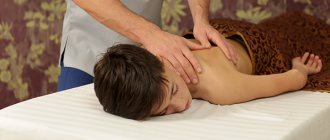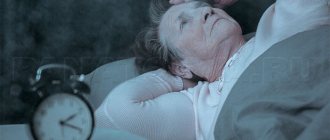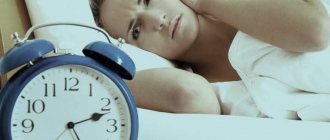45-50 years is the milestone after which the female body adapts to a new mode of life. A woman loses her ability to become pregnant. In her body, the concentration and ratio of hormones regulating this function changes dramatically.
The onset of menopause is accompanied by spontaneously occurring bouts of heat and sweating - the so-called “hot flashes”. A woman may also experience other disorders. For example, nighttime insomnia in the absence of any changes in the level of daytime activity.
Sleep problems and other signs of menopause
Quite often, women aged “45 plus” turn to doctors with a request to prescribe them pills for insomnia during menopause. Experts clarify: it is incorrect to talk only about insomnia. The hormonal changes that occur in the female body during this period provoke a fairly wide range of problems. These include difficulties falling asleep, frequent awakenings, getting up early for no reason, and nightmares...
Hormonal changes that occur in the female body during menopause provoke not only insomnia, but also other sleep disorders: difficulty falling asleep, frequent awakenings, getting up early for no reason, nightmares
How to return normal sleep after menopause?
If, as you approach menopause or after its onset, you have problems with sleep, do not try to solve them yourself, and especially do not ignore them, citing age-related changes. Sleep is important for the body both before and after menopause. Therefore, the best thing to do in this situation is to consult a doctor.
Many women benefit from hormone replacement therapy. It does not give immediate results, but after 3-6 months you will be able to improve the quality and duration of sleep, get rid of morning depression, stabilize your mood, and also reduce the frequency of “hot flashes” both at night and during the day. Melatonin before bedtime and daily 15-20-minute light therapy sessions in the blue wave spectrum in the morning can provide an additional effect.
If, against the background of menopausal changes, obstructive apnea syndrome has developed, drug treatment and physiotherapy are not enough. After a diagnostic study, the doctor will find a way to return you to a calm and, most importantly, safe sleep without stopping your breathing. Most often, for moderate to severe OSA, it is recommended to use a CPAP machine. For mild cases of the disease, individual intraoral appliances or some surgical procedures may help.
Treatment of apnea will not only protect you from the dangerous consequences of oxygen deprivation, but will also help you survive the onset of menopause with less effort.
Estrogens no longer protect during menopause
When menopause occurs, the level of the main female sex hormone, estrogen, sharply decreases. This is the most important cause of insomnia and other sleep problems. The fact is that estrogens protect sound sleep. If hormones are produced in sufficient quantities, then our brain can “ignore” unimportant external stimuli for the sake of proper rest.
During menopause, estrogen protection disappears and the brain overreacts to any, even the most insignificant, noise. Low estrogen levels cause us to flinch at every sound outside and wake up when our neighbors come home late.
Due to low estrogen levels during menopause, our brain overreacts to any noise, no matter how small.
A problem that is not easy to recognize
Most women are at least roughly aware of what happens as they approach menopause. But the problem is that many of the symptoms of menopause coincide with the symptoms of obstructive apnea, for example,
- sleep disturbance (snoring, insomnia, frequent awakenings at night),
- weight gain, incl. while maintaining previous eating habits,
- night sweats,
- mood swings, irritability,
- problems with concentration, memory impairment.
Thus, a woman often does not immediately detect a threat to her health in the form of obstructive apnea syndrome. There is a serious danger in this. Indeed, during respiratory arrest, the body experiences acute oxygen starvation, the total duration of which can reach several hours in one night. This negatively affects all vital organs and systems, i.e. brain and heart.
If you start snoring and suspect that it is accompanied by sleep apnea, you should make an appointment with a somnologist. The specialist will prescribe an examination to make an accurate diagnosis and, if necessary, prescribe treatment.
Manifestations of menopause: low progesterone
As is known, in menstruating women estrogen is synthesized in the first phase of the cycle, and progesterone in the second. This is another important female hormone that also affects the quality of sleep. Progesterone has a calming effect on the nervous system. But since female hormones during menopause are not produced in sufficient quantities, the lack of progesterone immediately affects our nerves.
It is because of progesterone deficiency that the brain is in constant arousal and does not allow sleep. Low progesterone “forces” us to “hold work meetings” all night long and endlessly scroll through the same thoughts in our heads. Due to the lack of the hormone, instead of a restful sleep, a wave of anxiety comes over us, we are thrown into the heat, then into the cold and have nightmares.
How to ease the course of menopause
It is necessary to make some changes in diet and lifestyle. Eat more dietary fiber and eliminate animal fat. Add a small amount of vegetable fats. Include calcium-rich foods in your diet; the recommended daily calcium intake for women over 50 is 1200 mg. per day, and for better absorption, do not forget about vitamin D.
Alcohol, smoking, caffeine, excessive consumption of salt and protein foods lead to the excretion of calcium in the urine. To reduce temperature changes, avoid spicy and strong drinks and try to lose excess weight. Eat foods containing phytoestrogens - plant compounds similar in structure to estrogen. If you suffer from migraines, limit your intake of tyramine and MSG.
Physical activity speeds up metabolism, improves heart and lung function, slows down the process of bone density decline, normalizes blood pressure, reduces the frequency of temperature changes, and improves mood through the production of endorphins in the brain.
Menopause and melatonin deficiency
After menopause, the body's ability to synthesize melatonin, a hormone that allows us to sleep soundly and fall asleep quickly, decreases. Another problem that arises during menopause is that it becomes more difficult to fall asleep. By the way, melatonin is called not only the sleep hormone, but also the hormone of youth, because it slows down the aging process and promotes cell restoration during sleep.
It is known that it is produced only in the dark, and any light sources block this process. That is why one of the important medical recommendations on how to behave during menopause is maintaining sleep hygiene. In the scientific world, such a concept as “light pollution” even appeared. It is becoming more and more difficult for a modern person to create a “dark corner” for a comfortable rest: lanterns are shining through the windows, the phone and tablet on charge are blinking, someone in the household is watching TV... All this interferes with the synthesis of melatonin. But a woman’s health after 45 years depends greatly on her proper rest. Sleep disorders prevent the body and brain from recovering properly overnight, making us an easy target for age-related diseases.
Never go to bed with the night light on or the curtains open, much less with the TV on. If this is not possible, use a special sleep mask.
The expert's advice is as follows: everything possible must be done to help the body replenish its melatonin reserves.
- Get into the habit of going to bed early. The sleep hormone is produced from midnight to four in the morning. At this time, sound and deep sleep is important.
- Eliminate all light sources. If light hits the retina, melatonin synthesis stops. Therefore, never go to bed with the night light on or the curtains open, much less with the TV on. When this is impossible, use a special sleep mask.
- After seven in the evening you need to prepare your body for bed. Therefore, it is better to turn off or dim the bright overhead lighting. But the soft light of a floor lamp or table lamp, on the contrary, has a calming effect.
- If you need to work in the evening, then it is better to use directional light and under no circumstances arrange a “white day” throughout the apartment.
Menopause: first symptoms and age
Menopause is manifested by the following symptoms:
- Irregular periods
- Unstable hormonal levels
- Hot flashes, sweating
- Frequent mood swings, depression, anxiety
- Decreased sex drive
- Deterioration of skin condition, hyperemia
- Sleep disorder
- Absent-mindedness
- Dry mucous membranes
- Enuresis
- Weight gain
There are three stages of menopause: premenopause, menopause and postmenopause.
Premenopause
Onset: 40–45 years, lasts up to ten years. Signs of premenopause:
- Destabilization of menstruation
- Frequent urination
- Increased thermal sensitivity
- Weight gain
- Skin problems
If you start to notice the above, it's time to see a doctor. Do not ignore the first signs so as not to develop problems with the heart, blood vessels and nerves in the future.
Menopause
Occurs between the ages of 49 and 55 years. At this stage it is impossible to conceive a child. Menopause is characterized by:
- Dysmenorrhea
- Aging skin
- Tides
- No lubrication in the vagina
- Brittle bones
Hot flashes are the most noticeable sign of menopause. The duration is approximately two minutes. Manifestations:
- Slight disorientation
- Feeling of heat in the upper body
- Hyperemia of the face and chest
- Sweat, palpitations
- Anxiety
Hot flashes do not pose a health risk. When this state occurs, it is advisable to find complete peace and take a deep breath. You can exclude the reasons that aggravate its manifestation: control emotions, give up spicy food, coffee and alcohol, do not wear excessively warm clothes, minimize stay in a stuffy room.
Important!
If hot flashes cause persistent discomfort, see a doctor.
Postmenopause
The third stage of menopause, postmenopause, begins around age 55 and lasts for about six years. The ovaries completely stop functioning. Postmenopausal symptoms:
- Pubic descent
- Lack of lubrication in the vagina
- Hair loss on the head
- Decreased vision
- Weight gain
Let's talk separately about perimenopause.
It begins with perimenopause and ends one year after the last menstruation.
As research by scientists from the Kharkov National Medical University has shown, one of the leading complaints with which 20-30% of women in the perimenopausal period turn to a gynecologist is uterine bleeding. They occupy a leading place among the reasons for women's hospitalization in hospitals. Excessive blood loss creates a risk of iron deficiency anemia, increases the risk of developing cancer, causes disruption of sexual life, and reduces quality of life. A common cause of uterine bleeding in the perimenopausal period is endometrial polyps. In women of older age groups, bleeding can occur not only with benign changes in the uterine mucosa, but also against the background of endometrial cancer. Peak incidence occurs between 55 and 65 years of age.
Menopause symptoms: restless legs syndrome
Poor sleep can be caused by restless legs. Such symptoms of menopause are often found in women after 50. Patients complain that they cannot sleep due to unpleasant sensations in the lower extremities (tingling, burning, goosebumps) and an obsessive desire to move their legs (stand up and stretch, because it becomes easier when moving) .
Why is this happening? Modern medicine believes that one of the decisive factors is hormonal imbalance. During menopause in women, the level of sex hormones in the blood sharply decreases, which in turn reduces the sensitivity of cells to hormones, in particular to the hormone and neurotransmitter dopamine. Dopamine is involved in the regulation of muscle tone and coordination of the work of different muscles. If the cells “do not perceive it, then symptoms such as persistent tension and the inability to relax occur. Treatment in this case should be comprehensive and require the cooperation of a gynecologist, endocrinologist and neurologist.
Discharge during menopause
During premenopause, menstruation gradually loses its former regularity: it may occur later or earlier than expected. Their intensity changes - and it can either decrease or increase. Occasional intermenstrual discharge is possible - light, “spotting”, brownish in color.
So-called menopausal bleeding, associated with impaired production of sex hormones, develops in women aged 40-50 years, before menopause. Typically, such bleeding begins after a missed period, but it may coincide with the expected period or even begin a little earlier. It differs from regular menstruation in its long duration - up to several weeks.
The intensity of such bleeding may vary and may be repeated. Sometimes they are quite abundant, even threatening health and life.
Menopausal bleeding requires treatment in a hospital, usually responds to hormone therapy, but surgery may also be required. As a rule, diagnostic curettage is required to clarify the diagnosis in such cases. This is necessary in order not to miss possible hyperplasia (overgrowth) of the endometrium, its polyps and other conditions that are also manifested by uterine bleeding. Treatment tactics will depend on the correct diagnosis.
Uterine bleeding that occurs in postmenopause is much more dangerous, as it often indicates a serious illness. For example, spotting in a woman not receiving hormone replacement therapy that occurs several years after menopause can be caused by uterine cancer or ovarian tumors. In this case, it is necessary to undergo a thorough medical examination as quickly as possible with mandatory separate diagnostic curettage of the mucous membrane of the cervix and body of the uterus. Early diagnosis allows for timely successful treatment.
Vasovegetative manifestations of menopausal syndrome
As a rule, insomnia is accompanied by other symptoms of menopause. At night, women experience a whole range of symptoms of so-called vasovegetative disorders: hot flashes and bouts of sweating, strong heartbeats and paresthesia (numbness or tingling sensations in various parts of the body). It is clear that sleeping pills are bad helpers in this situation. They will not be able to “remove” all these unpleasant signs of menopause that interfere with proper rest. What recommendations do doctors give us?
The first step in the fight against insomnia and other sleep disorders should be to eliminate the cause - hormonal imbalance. Hormone replacement therapy has proven itself in the treatment of such problems in menopause
What are the consequences of insomnia during menopause?
The sleep disturbance that occurs during menopause is usually accompanied by the following unpleasant symptoms for a woman:
- chronic fatigue;
- daytime sleepiness;
- bad feeling;
- stale complexion;
- sharp deepening of wrinkles;
- exacerbation of sluggish chronic diseases;
- depression.
Not all of these symptoms may be present at the same time. Each woman manifests them differently. Can be expressed to one degree or another.
Sleep disturbance during menopause: what to do
Take female hormones in tablets
During menopause, even the smallest sleep disorders threaten us with big troubles and significantly worsen the quality of life. Therefore, the first step in the fight against insomnia and other sleep disorders should be to eliminate the cause - hormonal imbalance. Hormone replacement therapy has proven itself in the treatment of such problems during menopause. However, even the most proven medications cannot be taken without a doctor’s prescription. A consultation with an experienced gynecologist-endocrinologist, which you can get directly on our website, will help you understand this issue in more detail.
Practice sleep discipline like Audrey Hepburn
“Sleep rules” sound like truisms, but nevertheless they must be followed. A good example of organizing sleep and wakefulness was demonstrated by Audrey Hepburn. The biography of the actress contains memories of her loved ones that she went to bed early and got up with the first rays of the sun.
Important: you need to go to bed and wake up at the same time; You cannot break this mode even on weekends or during vacation.
“I love being outside, I love long walks with my dogs and I love looking at trees, flowers and the sky,” the actress said.
Important: be physically active during the day, but three hours before bedtime you must complete all strenuous activities. Leisurely walks before bedtime and meditation are useful.
The bed should only be used for sleeping and sex
Psychotherapist Andrei Kurpatov in his book “The Cure for Insomnia” writes that for quality sleep it is necessary to build “the right associative connections.” Namely, use the bed only for sleep and sex. The body “remembers” that in bed we read books, work on the computer, watch TV, even have serious conversations, but do not sleep.
Medicine has long known the beneficial effects of sleep. While we sleep, the body produces special substances that calm, relieve stress and anxiety. It is no coincidence that our ancestors said: “the morning is wiser than the evening.” Agree, in the morning light, worries and fears no longer seem too threatening
Insomnia: where to look for the cause
Insomnia is not only an uncomfortable condition, but also potentially dangerous. After all, disturbances in night sleep not only significantly deplete the nervous system, but also interfere with normal recovery. As a result, immunity decreases, the risk of obesity, diabetes, vascular pathologies and many other complications increases. And the causes of insomnia are often not as “deep” as they seem.
"Nervous" balance
The most common “explanation” for insomnia is stress and overwork. And there is certainly some truth in this. However, only a fraction, because not all people experiencing stress develop insomnia.
The fact is that sleep and falling asleep disorders are based on a genetic tendency to hyperexcitability. And “carriers” of such a feature are usually called emotional and sensitive people.
In such people, excitatory neurotransmitters are synthesized faster than usual. And regular lack of sleep at night does not allow normal restoration of the level of sedatives. As a result, the “excitation-inhibition” balance is disrupted towards the former, which symptomatically manifests itself as insomnia or mental disorders of an anxious nature.
Another trigger factor for insomnia is “everyday irritants.”
We are talking about flickering screens, watching “adrenaline” films (thrillers, horrors), extraneous sounds (falling asleep “to a series”), bright lighting in the late evening and a “night light” during sleep, overeating before bed, as well as microclimate factors (“ stuffiness", cold or, conversely, heat).
All of these factors only support the “pocket of overexcitation” that has formed during the day, which does not allow you to fall asleep and get a good night’s sleep. And the presence of lighting, among other things, disrupts the production of melatonin. Sleep, if it does occur, becomes anxious and superficial, and recovery from such sleep obviously “leaves much to be desired.”
If the correct “tradition” of going to bed is formed and applied daily, the body is provided with the “consumables” of sleep and rest (amino acid tryptophan, vitamin D, B3, B5, B6, B9 and B12, calcium, magnesium, iron and some others), and Insomnia still “persists” - it’s worth checking your hormone levels.
Sleep and hormones
In addition to the well-known “sleep hormone” melatonin, the following may also be involved in sleep disorders:
- pituitary growth hormone,
- thyroid
- and adrenal glands.
The somatotropic hormone of the pituitary gland, or “growth hormone,” along with melatonin, is involved in maintaining the deep sleep phase. Therefore, when it is deficient, sleep becomes superficial and recovery is poor quality.
In the presence of hyperfunction (or tumor) of the adrenal glands, the level of cortisol and other stress hormones (cortisol, adrenaline, norepinephrine) sharply increases in the blood, which have an “overexciting” effect on the nervous system and thereby provoke disturbances in falling asleep and staying asleep.
It is best to check the level of “adrenal” hormones in urine, since they do not last long in the blood:
- for cortisol - this is a urine test for cortisol,
- and for catecholamines (adrenaline, norepinephrine, dopamine) - urine analysis for their metabolites.
Hyperthyroidism, or an excess of “thyroid” hormones, is laboratory manifested by an increase in free TSH in the blood and a change in TSH. And symptomatically, this provokes: irritability (and even aggressiveness), emotional instability, anxiety, disturbances in thinking abilities (“fuss of thoughts” that does not allow concentration) and sleep. After all, the thyroid gland is a well-known stimulator of the nervous system and metabolic processes.
Hyperthyroidism is also accompanied by increased heart rate and increased blood pressure, digestive disorders, hair loss, skin problems and some other symptoms. While the prevalence of pathology can be called universal. And, most often, women suffer from it.










